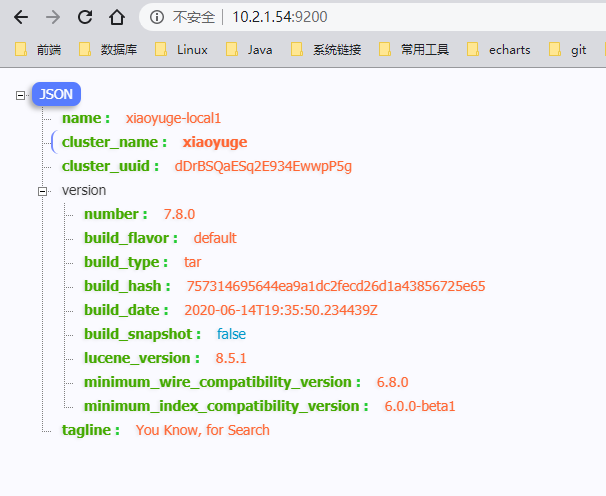1. JDK14安装
下载jdk14: https://jdk.java.net/14/
将文件存放在linux系统某文件夹内
解压
1
tar -zxvf openjdk-14.0.2_linux-x64_bin.tar.gz
配置环境变量
1
2
3
4
5
6vim /etc/profile
#在文件最末尾添加,其中JAVA_HOME是jdk解压后的文件路径
JAVA_HOME=/usr/lib/tools/jdk-14.0.2
PATH=$JAVA_HOME/bin:$PATH
CLASSPATH=$JAVA_HOME/jre/lib/ext:$JAVA_HOME/lib/tools.jar
export PATH JAVA_HOME CLASSPATH保存后,更新配置文件
1
source /etc/profile
查看JDK是否配置完成
1
java -version
出现下图表示安装成功!

2. ElasticSearch安装
解压tar.gz包
1
tar -zxvf elasticsearch-7.8.0-linux-x86_64.tar.gz
添加elasticsearch用户
1
useradd elastic
赋予elastic search操作文件夹的权限
1
chown -R elastic:elastic /usr/lib/tools/elasticsearch-7.8.0/*
查看本机的hostname
1
2hostname
localhost.localdomain修改elastic search配置
1
2cd ./elasticsearch-7.8.0/config
vim elasticsearch.ymlelasticsearch.yml
1
2
3
4
5
6
7
8
9
10
11
12
13
14
15
16
17
18
19
20
21
22
23
24
25
26
27
28
29
30
31
32
33
34
35
36
37
38
39
40
41
42
43
44
45
46
47
48
49
50
51
52
53
54
55
56
57
58
59
60
61
62
63
64
65
66
67
68
69
70
71
72
73
74
75
76
77
78
79
80
81
82
83
84
85
86
87
88
89
90
91
92
93
94
95# ======================== Elasticsearch Configuration =========================
#
# NOTE: Elasticsearch comes with reasonable defaults for most settings.
# Before you set out to tweak and tune the configuration, make sure you
# understand what are you trying to accomplish and the consequences.
#
# The primary way of configuring a node is via this file. This template lists
# the most important settings you may want to configure for a production cluster.
#
# Please consult the documentation for further information on configuration options:
# https://www.elastic.co/guide/en/elasticsearch/reference/index.html
#
# ---------------------------------- Cluster -----------------------------------
#
# Use a descriptive name for your cluster:
#集群名称,默认可以不修改,此处 xiaoyuge
cluster.name: xiaoyuge
# ------------------------------------ Node ------------------------------------
#
# Use a descriptive name for the node:
#节点名称,必须修改 ,默认修改为当前机器名称,若是多实例则需要区分
node.name: xiaoyuge-local1
#
# Add custom attributes to the node:
#
#node.attr.rack: r1
#
# ----------------------------------- Paths ------------------------------------
#
# Path to directory where to store the data (separate multiple locations by comma):
##数据目录与日志目录,默认在当前运行程序下,生产环境需要指定
#path.data: /path/to/data
#
# Path to log files:
#
#path.logs: /path/to/logs
#
# ----------------------------------- Memory -----------------------------------
#
# Lock the memory on startup:
#内存交换锁定,此处需要操作系统设置才生效
#bootstrap.memory_lock: true
#
# Make sure that the heap size is set to about half the memory available
# on the system and that the owner of the process is allowed to use this
# limit.
#
# Elasticsearch performs poorly when the system is swapping the memory.
#
# ---------------------------------- Network -----------------------------------
#
# Set the bind address to a specific IP (IPv4 or IPv6):
#IP 地址,默认是 local,仅限本机访问,外网不可访问,设置 0.0.0.0 通用做法
network.host: 192.168.135.111
#
# Set a custom port for HTTP:
#访问端口,默认 9200,9300,建议明确指定
http.port: 9200
transport.port: 9300
#
# For more information, consult the network module documentation.
#
# --------------------------------- Discovery ----------------------------------
#
# Pass an initial list of hosts to perform discovery when this node is started:
# The default list of hosts is ["127.0.0.1", "[::1]"]
## 集群发现配置
discovery.seed_hosts: ["192.168.135.111:9300"]
#
# Bootstrap the cluster using an initial set of master-eligible nodes:
#
cluster.initial_master_nodes: ["192.168.135.111:9300"]
#
# For more information, consult the discovery and cluster formation module documentation.
#
# ---------------------------------- Gateway -----------------------------------
#
# Block initial recovery after a full cluster restart until N nodes are started:
#
#gateway.recover_after_nodes: 3
#
# For more information, consult the gateway module documentation.
#
# ---------------------------------- Various -----------------------------------
#
# Require explicit names when deleting indices:
##防止批量删除索引
action.destructive_requires_name: true
#设置密码
xpack.security.enabled: true
xpack.license.self_generated.type: trial
xpack.security.transport.ssl.enabled: true
http.cors.enabled: true
http.cors.allow-origin: "*"
http.cors.allow-headers: Authorization切换为elastic search用户,然后启动elastic search
1
2su elastic #切换用户
./bin/elasticsearch -d #后台启动设置密码
1
2
3
4
5
6
7
8
9
10
11
12
13
14
15
16
17
18
19
20
21
22
23
24
25./bin/elasticsearch-setup-passwords interactive
执行设置用户名和密码的命令,这里需要为4个用户分别设置密码,elastic, kibana, logstash_system,beats_system
Initiating the setup of passwords for reserved users elastic,kibana,logstash_system,beats_system.
You will be prompted to enter passwords as the process progresses.
Please confirm that you would like to continue [y/N]y
Enter password for [elastic]:
passwords must be at least [6] characters long
Try again.
Enter password for [elastic]:
Reenter password for [elastic]:
Passwords do not match.
Try again.
Enter password for [elastic]:
Reenter password for [elastic]:
Enter password for [kibana]:
Reenter password for [kibana]:
Enter password for [logstash_system]:
Reenter password for [logstash_system]:
Enter password for [beats_system]:
Reenter password for [beats_system]:
Changed password for user [kibana]
Changed password for user [logstash_system]
Changed password for user [beats_system]
Changed password for user [elastic]
常见异常:
1 | java.lang.RuntimeException: can not run elasticsearch as root |
1 | Exception in thread "main" java.nio.file.AccessDeniedException: /usr/lib/tools/elasticsearch-7.8.0/config/elasticsearch.keystore |
1 | ERROR: [2] bootstrap checks failed |
效果如下:

3. Kibana安装
解压文件
1
tar -zxvf kibana-7.8.0-linux-x86_64.tar.gz
修改配置文件
1
vim ./config/kibana.yml
kibana.yml:
1
2
3
4
5
6
7
8
9
10
11
12
13
14
15
16
17
18
19
20
21
22
23
24
25
26
27
28
29
30
31
32
33
34
35
36
37
38
39
40
41
42
43
44
45
46
47# Kibana is served by a back end server. This setting specifies the port to use.
##访问端口,默认无需修改
server.port: 5601
# Specifies the address to which the Kibana server will bind. IP addresses and host names are both valid values.
# The default is 'localhost', which usually means remote machines will not be able to connect.
# To allow connections from remote users, set this parameter to a non-loopback address.
#访问地址 IP,默认本地 ;如果需要外网访问,则配置0.0.0.0
server.host: "0.0.0.0"
# Enables you to specify a path to mount Kibana at if you are running behind a proxy.
# Use the `server.rewriteBasePath` setting to tell Kibana if it should remove the basePath
# from requests it receives, and to prevent a deprecation warning at startup.
# This setting cannot end in a slash.
#server.basePath: ""
# Specifies whether Kibana should rewrite requests that are prefixed with
# `server.basePath` or require that they are rewritten by your reverse proxy.
# This setting was effectively always `false` before Kibana 6.3 and will
# default to `true` starting in Kibana 7.0.
#server.rewriteBasePath: false
# The maximum payload size in bytes for incoming server requests.
#server.maxPayloadBytes: 1048576
# The Kibana server's name. This is used for display purposes.
#server.name: "your-hostname"
# The URLs of the Elasticsearch instances to use for all your queries.
# ES 服务指向,集群下配置多个
elasticsearch.hosts: ["http://192.168.135.111:9200"]
# When this setting's value is true Kibana uses the hostname specified in the server.host
# setting. When the value of this setting is false, Kibana uses the hostname of the host
# that connects to this Kibana instance.
#elasticsearch.preserveHost: true
# Kibana uses an index in Elasticsearch to store saved searches, visualizations and
# dashboards. Kibana creates a new index if the index doesn't already exist.
# Kibana 元数据存储索引名字,默认.kibana 无需修改
#kibana.index: ".kibana"
# The default application to load.
#kibana.defaultAppId: "home"
# If your Elasticsearch is protected with basic authentication, these settings provide
# the username and password that the Kibana server uses to perform maintenance on the Kibana启动
1
2
3
4当前窗口内启动
./bin/kibana#
后台进程启动
nohup ./bin/kibana &效果如下

遇见问题:
root启动报错

1
2切换到elastic账户
su xiaoyugeelastic用户权限不足 Babel could not write cache to file: /usr/share/kibana/optimize/.babel_register_cache.json

1
2
3
4
5
6
7切换到root用户
su root
赋予elastic账户 xiaoyuge操作权限
chown -R xiaoyuge /usr/local/kibana-7.7.1-linux-x86_64
切换为elastic账户
su xiaoyuge
再次启动即可


